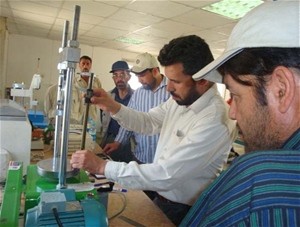
Engineer Mohammad Ashraf, manager of the Kabul Central Laboratory, demonstrates one of the quality control instruments employed to test the materials used to build Afghanistan's roads.
USAID/AIRP
A USAID-trained engineer opens a business and develops a new generation of Afghan professionals
18 OCTOBER 2011 | KABUL, AFGHANISTAN
"For me and for other Afghan engineers, this project was like a university," explains Engineer Mohammad Ashraf, as he surveys the construction materials and testing equipment that line the shelves of Kabul’s Central Laboratory. After eight years of service on a USAID road development initiative that operates the lab, Ashraf is leaving in order to set up on his own.
When he first joined the laboratory, Ashraf worked as a quality control inspector, testing the concrete, cement, soil, aggregate, asphalt, and asphalt bitumen, which are used to build USAID-funded roads across Afghanistan. Promoted first to lab engineer and then to materials engineer, supervisors soon recognized Ashraf’s potential. Gaining further technical and organizational experience, Ashraf took on the position of laboratory manager and began to share his knowledge with other Afghans.
In addition to project staff and local subcontractors, Ashraf trained 46 engineering students from universities across Afghanistan during a period of four years. Equipped with both theoretical and practical materials testing experience, these students went on to obtain managerial positions in independent companies and began, in turn, to pass on their expertise to others. Realizing the direct contribution he could make to Afghanistan’s private engineering industry, Ashraf rented an office, purchased laboratory equipment, and hired 25 experienced engineers and technicians. Following a year of careful planning with his brother, a fellow USAID-trained engineer, Ashraf will shortly commence the first round of training for staff from local engineering firms.
As he closes the door to the Kabul Central Laboratory for the last time, Ashraf reflects on the journey he has made. "I am grateful for the support I have received," he said. "It is this foundation that has given me the strength to establish my own laboratory."
USAID has faith in its efforts to help Afghans develop a new generation of leaders. Perhaps, one day, it will outsource its laboratory work to the businesses that it helped to start, like Ashraf’s.







Comment
Make a general inquiry or suggest an improvement.